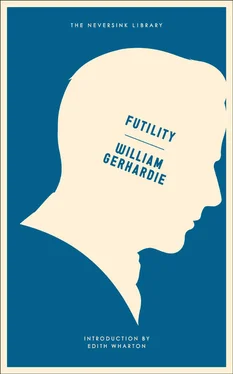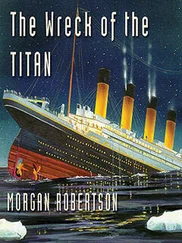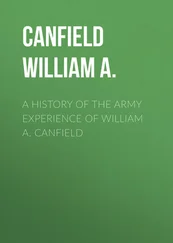“Nina,” he said.
“Yes?” She turned round.
“Don’t go.”
“I must.”
“You won’t come back. She will keep you.”
She shook her head.
“Don’t go, Nina.”
“Don’t go,” I said.
She stood thoughtful, in indecision.
“Don’t, Nina,” cut in Nikolai Vasilievich.
She did not answer.
“Nina,” he said again.
“No, she must,” intervened Fanny Ivanovna. “This is all nonsense! She will go and come back quickly. Won’t you, Nina?”
“Yes,” said Nina.
She turned to me and slipped her hand under my arm. “I won’t let you go,” she said petulantly. “You’ll have to come with me.”
“You know I can’t.”
“I won’t let you go.”
“Nina,” I said.
“Yes?”
“Come here.”
I took her aside.
“Nina, will you marry me?”
She looked flippant and humorous and yet there was just a trace of seriousness in her look.
“Yes.”
I felt relieved — oddly as I might feel if I had just concluded a satisfactory business transaction.
The second whistle went, and with the other passengers they boarded the train. Nikolai Vasilievich came up to her to say good-bye and probably thought he might chance it once again.
“Don’t go, Nina. Nina!”
“I shall come back,” said Nina.
Then they all said good-bye to Vera, and no excess of emotion was displayed on either side.
“Good-bye!” was said again. Then the train moved, and they waved handkerchiefs.
V
I CALLED ON THEM ONE EVENING IN NINA’S absence and chanced to find Fanny Ivanovna alone. Nikolai Vasilievich, as ever, was out. Sonia had gone to see a friend.
“Sit down, Andrei Andreiech,” she said. “I am always doing needlework, as you see.…”
I took a chair.
“I do it.… It is extraordinary, Andrei Andreiech. I thought I would do it so as not to think, but it’s just the very work to make you think. And so I gave it up and began reading in order to forget, in order not to think, and I found, Andrei Andreiech, that I could not read because I had to think. I think all day and night. Ach! Andrei Andreiech.”
And I knew that she was going to confide in me.
“ Ach! Andrei Andreiech! Andrei Andreiech! If you only knew.…”
She glanced behind her at the door to make sure that nobody could hear her.
“ Ach! Andrei Andreiech!”
I waited patiently for her to begin.
She said “ Ach! Andrei Andreiech!” several times more and then began. She spoke in marks of exclamation.
“I suppose you know, Andrei Andreiech, that I am not Nikolai Vasilievich’s … legal wife?”
“I know,” I said.
“How did you know?” she turned on me.
“I suspected it.”
She paused.
“Well, now that you actually know so much, I feel that I must tell you everything, if only in fairness to myself. But don’t tell the children. They would be shocked if they knew that I had told you.”
“No,” said I.
“ Ach! Andrei Andreiech, you know.… You know.…” She suddenly plunged into her native German, the foreign Russian tongue being inadequate to express her overflowing feelings, but now and then, quite unintentionally, she would employ some Russian word that came handy to her, that in her excitement she could not be bothered to translate as she proceeded to unload her feelings — an urgency too long deferred.
“Andrei Andreiech!” she said again and again in a kind of appeal to my sense of justice. “ Sie sollen wissen that I met Nikolai Vasilievich in Switzerland, in Basel, when he was there on a cure, after he had separated from his wife. He was very handsome. He is still very handsome, ach! much too handsome. You would not think that he was fifty-three.… Ach! Andrei Andreiech, I have so much, so very much to tell you that I don’t really know where to begin.…
“Well, I met him. I knew that he was married; he told me so himself from the first. He was always straight and honourable and above-board. He said that he had separated finally from his wife and expected to get a divorce, and that I was to come to Petersburg with him and wait till he got his divorce, and then we were to be married at once. You see, we loved each other.” She looked at me.
“Quite,” I said.
“I must tell you here,” she continued, “more about myself and my feelings and desires at that time. I belong (I hope you will forgive me for saying it, but it is a salient point in my tragedy) to a very proud family indeed. My father and all my brothers were officers in the German Guards. Soon after my father’s death we lost all our money. I had to set out in search of a livelihood because I, as the eldest sister, had to ensure that my sisters’ education was not interrupted and that it should be possible for my brothers to remain in the army. I had a good voice and … I went on the stage, into musical comedy. And, Andrei Andreiech, curious, is it not, that in spite of the fact that I and I alone kept the whole of our family — my sisters, my brothers, my aged mother, my grandfather, my grandmother and two of my aunts — they were ashamed of me. You see, I became almost what you would call ‘a star.’ I don’t want you to misunderstand me. I shouldn’t have said that they were ashamed of me. That is misleading. They were ashamed of my profession, as I was myself, of course. I understood them. I revelled in my sacrifice. I was young, good-looking then. Don’t look at me now, Andrei Andreiech. I have changed through suffering and age. Then, suddenly, I was seized by a craving for decency, respectability. You see, no woman really knows what it means to be respectable until she’s had to give it up. I thought: if only I could marry a man who was respectable and rich, who would be willing to support my family! My heart craved for the title, the status, of a married woman because that title was denied me.
“And then came Nikolai Vasilievich.
“I loved him. Love was thrown into the bargain. It was unexpected, irrelevant. And then love became salient, supreme, altogether dominating; and as I realized how I loved him, so I realized that my family, my sacrifice and all that this had once meant to me, were but of secondary importance in the face of my love. Love was some greater thing — altogether greater. And Nikolai was rich. He owned a large house in Petersburg and had gold-mining concessions in Siberia. But that seemed a minor point. He was to get his divorce and then we would be married.
“We came to Petersburg and immediately got busy with the divorce. He visited lawyers. His friends and relatives all intervened and gave him advice, some in favour of a divorce and others against it. I did not at that time know what a hopeless, cruel and heartbreaking thing a Russian divorce really is. Nikolai’s wife did all she possibly could to prevent his getting a divorce. Eisenstein, the man she ran away with before Nikolai Vasilievich and I met, had no money. He was a Jew dentist, with no practice. They succeeded in proving to Nikolai Vasilievich’s satisfaction — I never quite followed the case — that if he asked for a divorce he would be compelled to plead guilty and so lose the children; and Nikolai Vasilievich was determined to keep the children. On my advice, Andrei Andreiech. I had begged of him, entreated him, insisted on it. ‘Divorce or no divorce, you must keep the children, Nikolai,’ I said. I knew that they would be spoilt, their lives marred and wasted, if they fell into the clutches of their mother and that Jew dentist. Yes, I insisted on it, Andrei Andreiech, even if it meant that there was to be no divorce. And what that cost me!..
“For I hadn’t told my people in Germany that Nikolai was married at the time. I didn’t want to add further injury to their pride. I thought it would be a matter of a few weeks and that then Nikolai and I would be married, and all would be well. How could I know? How could we know?
Читать дальше












